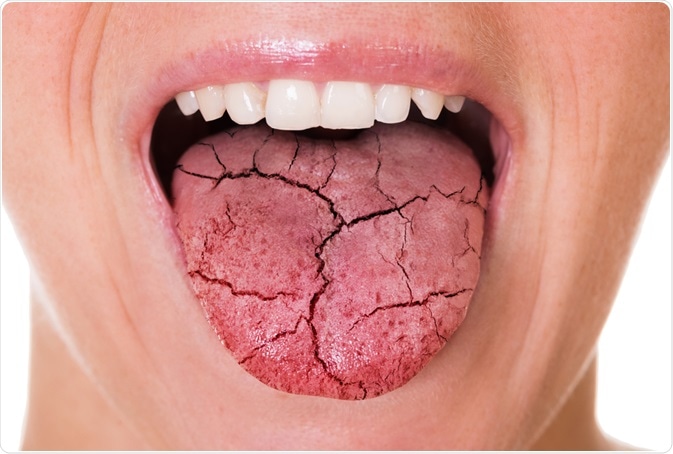Xerostomia is the feeling of having a persistent and unusually dry mouth. Xerostomia is caused by reduced or insufficient saliva production by the salivary glands found in and around the mouth and throat.

Image Credit: Andrey Popov / Shutterstock.com
Xerostomia can be caused by many factors, including anxiety, autoimmune diseases that attack the salivary glands such as Sjögren’s syndrome, radiation to the head or neck during cancer treatment, or as a symptom of certain medical conditions such as diabetes. Many medications report dry mouth as one of their side effects, and this is one of the leading causes of xerostomia. In fact, over 1,100 medications include dry mouth as a side effect.
Xerostomia is a fairly prevalent condition, affecting 5.5%−46% of the adult population. The incidence of xerostomia increases with age, with nearly half of the elderly population complaining of dry mouth. However, it remains unclear if there is a direct relationship between old age and reduced saliva production or if this is correlation is due to the increased number of medications commonly taken by the elderly.
Role of saliva
Saliva is a clear, watery fluid produced by the three large salivary glands including the submaxillary, sublingual, and parotid glands, along with several smaller ones. In healthy people, saliva normally flows at a rate of 1.5−2.0 milliliters (mL) per minute when stimulated through taste, smell, or thought, and at a rate of 0.3−0.4 mL per minute when unstimulated. In people with xerostomia, the stimulated saliva flow rate can be as low as 0.5−0.7 mL per minute with an unstimulated rate of fewer than 0.1 mL per minute.
Proper saliva production is important for overall patient comfort and dental hygiene. Saliva blankets the mouth and teeth with constant moisture, thus providing lubrication and protection to the oral cavity. Saliva contains several proteins that function in digestion, antibacterial activity, and maintenance of proper oral pH.
Insufficient saliva production can affect chewing, swallowing, speech, taste, and dental hygiene. Saliva is very important for protecting teeth from dental decay because it limits bacteria growth, neutralizes food acids, and helps wash away food particles lodged in the teeth.
Symptoms
Symptoms of xerostomia can include a persistent dry mouth and thick or mucous-laden saliva. Dental professionals may recognize insufficient pooling of saliva in the mouth during dental exams.
Many xerostomia sufferers report changes in food taste and difficulty swallowing or chewing food, especially dry foods, such as crackers or bread products. The need and desire to frequently drink water are also increased in individuals with this condition. Some xerostomia patients also experience a burning or tingling sensation on the tongue or in the mouth.
Xerostomia can have severe effects on dental health, with patients commonly experiencing increases in the number of dental cavities, gum disease, and bad breath. Xerostomia sufferers who wear dentures typically have trouble keeping them in place and complain of denture sores.
Untreated xerostomia can lead to oral yeast infections, salivary gland infections, as well as dry and cracking lips and tongue. Therefore, early detection and treatment of xerostomia are important for patient health and well-being.
References
Further Reading
Last Updated: Dec 22, 2022